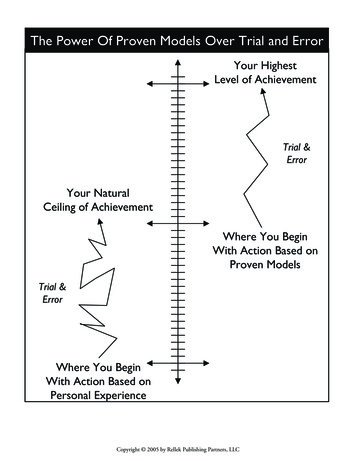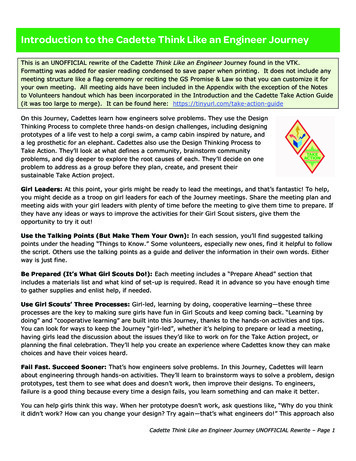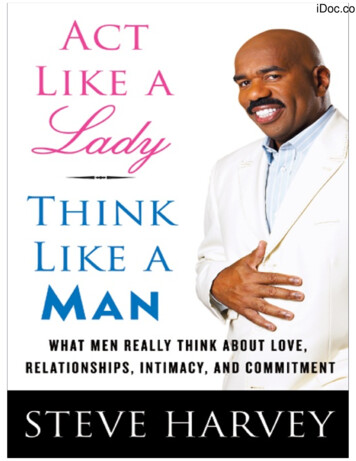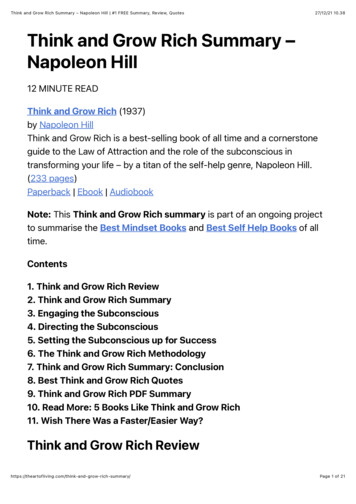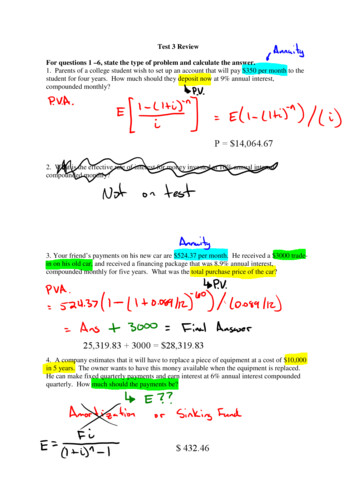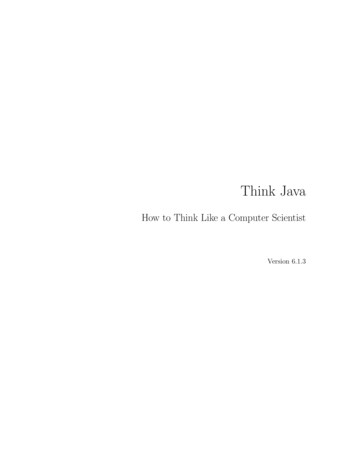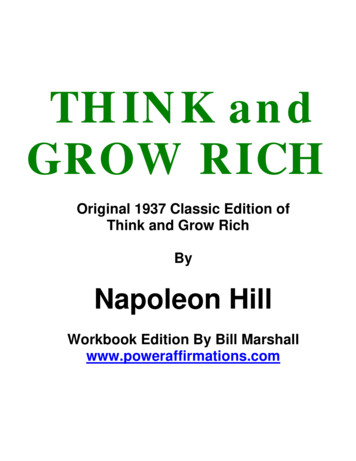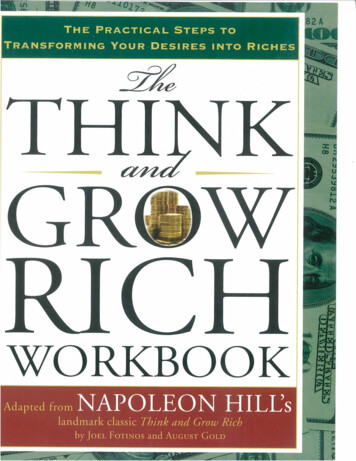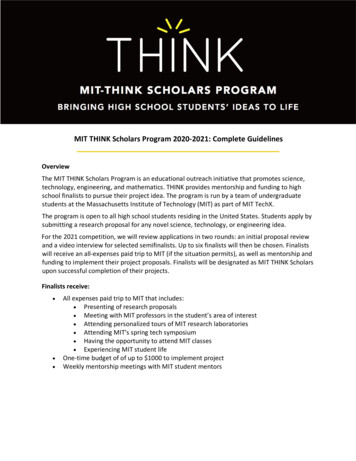
Transcription
How to Think Like a MillionaireMarc FisherMarc Allen
How to Think Like aMILLIONAIREHow to Think Like aMILLIONAIREMARK FISHERWITH MARC ALLENSecond EditionNEW WORLD LIBRARYN OVATO , C ALIFORNIANew World Library14 Pamaron WayNovato, California 94949Copyright 1997 by Mark Fisher and Guy PerronAll rights reserved. This book may not be reproduced in whole or in part, or transmitted in any form,or by any means -- electronic, mechanical, recording, or other -- without written permission fromthe publisher, except by a reviewer who may quote brief passages in a review.Type design by Tona Pearce MyersLibrary of Congress Cataloging-in-Publication Data is available upon request.First printing of second edition, August 2008ISBN 978-1-57731-643-5Printed in Canada on 100% postconsumer-waste recycled paperNew World Library is a proud member of the Green Press Initiative.10 9 8 7 6 5 4 3 2 1
ContentsEditor's PrefaceAuthor's PrefaceIntroductionCHAPTER 1: Where Do I Start?CHAPTER 2: Wealth Is a State of MindCHAPTER 3: Eliminating Mental BlocksCHAPTER 4: Making DecisionsCHAPTER 5: Do What You LoveCHAPTER 6: The Magic of GoalsCHAPTER 7: A Plan of ActionConclusionReferencesAbout the AuthorsEditor's PrefaceT his is a book about success cowritten by two people who have been there and are writing fromtheir personal experience. They have taken on the challenge of summarizing as clearly and brieflyas possible everything they have learned and put into practice that has contributed to theirsuccess. The results are powerful -- but then, two remarkable people contributed to this book:Mark Fisher, in his book The Instant Millionaire , gave us a fable-like telling of his life's story,featuring his mentor, who taught him the principles and practices necessary to becoming afinancial success.Marc Allen is the author of Visionary Business: An Entrepreneur's Guide to Success , a leadingedge guide for anyone in any type of business. This book is excellent for initiating change in anexisting corporate culture or in setting an exciting, successful course for a new business.The two of them together encourage all of us -- and better yet, show all of us how -- to create ourown unique form of success, however we define it: whatever we dream of, whatever we wish to
create in our lives.How to Think Like a Millionaire teaches in a clear, understandable, simple way -- with practical,workable procedures based on Universal Law -- how to open the door to a revitalizing, lifechanging way of thinking. There are nuggets of pure gold in its pages, crystal-clear recipes forsuccess.How to Think Like a Millionaire is not a book to be hurriedly or superficially read. It must beabsorbed deeply to receive the wisdom it contains. I urge you, after reading it once or twice, to giveit slow, deep, and deliberate consideration and to apply the recommended action steps at the endof each chapter in a way that fits your own nature and understanding.I encourage you to read these pages with a mind that is open to all possibilities. Because I know,through personal experience, that if you apply the principles described in this book wisely andintelligently, there can be no uncertainty as to the outcome of any endeavor, and no limit to yoursuccess.Becky Benenateformer editorial directorNew World LibraryAuthor's PrefaceO ver the years, enthusiastic readers from all over the world have written me many wonderfulletters. Most of them ask me about The Instant Millionaire 's formula to become rich and happy.I've tried my best to answer their questions, but I have not been able to answer all the letters in asmuch detail and as thoughtfully as I would like. I often thought about this problem and evenmeditated on it as I contemplated the heart of a Queen Elizabeth rose -- my favorite! -- that growsin my garden. . . .One day, a solution came to me: I would write one long letter that would attempt to answer all thequestions I had been asked. The letter grew and grew, as I kept adding to it over a period of nearlythree years. It got so long that it was too lengthy to easily duplicate -- and I realized I had a booklength manuscript on my hands.I sent it to my publisher -- and friend -- Marc Allen, who had just written a very impressive andinspiring book, Visionary Business: An Entrepreneur's Guide to Success . Marc was so enthusiasticabout all my notes that he wanted not only to publish them, but to add a lot of his ideas as well. Wecollaborated for several months, through several drafts, and he added so much that I felt hedeserved credit as a coauthor. And Becky Benenate, former editorial director of New World Library,added quite a bit as well, as a highly supportive and capable editor.The result was exciting: Two self-made millionaires from very different backgrounds writing backand forth, attempting to summarize every valuable piece of advice we have ever received, andeverything we have put into practice, into a single, concise work.It has certainly evolved far beyond my initial idea! With every addition, every rewrite, it grewstronger and stronger, until it was something I feel honored and proud to have published. I hope
you will find it a powerful and practical tool to help you truly succeed -- in any and every way youchoose to define success.One can never consent to creep when one feels an impulse to soar.-- HELEN KELLERIntroductionS uccess is an attitude. Success is a habit. Success is easily available to all who want it, believethey can have it, and put their desires into action.Success has no secrets. Many who achieve it readily tell their stories of devoting years to theirwork, to their passion and dreams, before they finally became successful. The main theme isalways the same; in every case: They love their work . They would have done it anyway. Greatfortunes -- or at least some level of financial stability and success -- were often part of the dream,but the wealth was a by-product of following their passion. Could you imagine Steven Spielbergmaking a million dollars a day if he hated movies and funny-looking extraterrestrials? What if HenryFord hadn't been fascinated with machinery? If Donna Karan hated clothes? When we do what welove, offering our gifts and talents, without causing harm to anyone, we are working at the highestlevel of service for ourselves, those around us, and our planet.Success can't be attributed to fate, but to the deliberate application of very specific principles. Luckmay be involved, but only because, as has been said, luck occurs when preparation meetsopportunity.Age, education, money, background, and childhood experience do not matter in the face of theseprinciples. The childhoods of the world's richest self-made millionaires, successful artists, andnoted performers were many times rather commonplace, often poor, and sometimes miserable. Atschool, many of them were considered slow learners. Yet, each one of them, at a crucial momentin their lives, decided to take their fate into their own hands and, enlightened by a book, by theword or example of another, or by a powerful sense of intuition, set out to be successful.You may have reached that critical point that will change your life. No matter how old you are orwhat circumstances you may be in, all you have to do is be alert and receptive -- and believe.Know that it's possible to start from scratch -- as so many others have done -- and achieve evenyour loftiest goals. It's just a matter of believing it is possible and becoming determined to createthe life you desire.In our instant-gratification society, we often look only at the final product: the movie star, themillionaire, the acclaimed artist. It looks like overnight success. We don't see the years ofdedication and patient persistence that went into the process. Dustin Hoffman joked that it took himten years to become an overnight success. And Ray Kroc, the founder of McDonald's, wrote in hisautobiography, "I was an overnight success all right, but thirty years is a long, long night."A very important aspect of successful people is that they all had failures, sometimes many failures.Most people never reach success because they give up after one or two setbacks. Napoleon Hill'sclassic Think and Grow Rich recounts the story of a miner who gave up after months ofprospecting -- three feet from the gold. But he applied this lesson to everything in his life thereafter
and eventually became very successful.As we begin the new millennium, success takes on a new meaning. Fewer people are interested inmaintaining a workaholic fever to achieve millions while sacrificing health and home life. Successand prosperity now certainly include a balanced life: performing satisfying work while maintainingfitness and health, having loving relationships and a happy family life, being involved in socialactivities and causes, and having a sense of inner peace and fulfillment. In a recent New YorkTimes poll, most people surveyed said it was more important to them to slow down, work less, andspend more time with friends and family than to pursue more prestige and possessions.True success can include all of this. Presenting our passionate work to the world is a service to allthose around us. Building beautiful relationships and having the time to relish them is an ambitionwe can all achieve, if we choose to. Well-thought-out work habits -- especially the habits of mind -can bring financial security and wealth. With wealth, we have greater freedom to pursue what weenjoy, as well as to give back to the world and help others.An old Chinese proverb says that a journey of a thousand miles begins with one step. By decidingto read this book you have just taken the first step toward success and living your dreams.Everything in life is a matter of choice. The purpose of this book is not only to help you clarify theoptions open to you so that you can discover what you really want, but also to help you to achievethose goals.Perhaps, like so many others, you're unemployed, underemployed, misemployed, or otherwisedissatisfied with your present job. Despite what you may think, despite the "hard times" we areexperiencing (that oft-repeated, age-old fallacy, as we shall see further on), despite unemploymentand inflation, you can find the ideal job you dream of -- faster than you ever believed possible. Inspite of the fact that most people presume you can't always do everything you want to in life, youcan find a career that will truly satisfy you. It is your right, after all. Your poverty, ill health,loneliness, and misery serve absolutely no one.A word of warning: Quite often you'll find advice on developing entrepreneurship and setting up abusiness. This isn't meant to encourage you to drop everything you are doing and go into businessfor yourself. Not everyone is cut out for this. You need a certain type of personality, and you haveto feel a real need to go out on your own. If you feel this urge, then you probably already have thebasic qualities of an entrepreneur. This book can be a guide. But even if you aren't theentrepreneurial type, this book will still show you how to improve your position in life, your materialassets, and your outlook, without compromising your basic security.Some of these principles might seem original and surprising, others might seem commonplace.Don't let appearances deceive you. Success depends on them. Don't be put off by the apparentsimplicity of some of these golden rules. The most obvious ideas are sometimes the most difficultto incorporate into our daily routine. Take some time to think them over. Are you applying themalready? Are they part of your life and working habits?Read this book slowly. Stop and reflect often on the words, and apply them to your life'sexperience. There is repetition in this book: These simple truths must be repeated, again andagain, until we understand them consciously and, even more important, until the subconsciousmind absorbs them and acts on them. Then we see great changes happening in our lives."Give me a lever and a point of support," said Archimedes, "and I will lift the world." To achievesuccess, you need leverage. Here, in this book, is the leverage and support for you to achieve yourdreams.
Chapter OneWHERE DO I START?The secret of getting ahead is getting started. The secret of getting started is breaking yourcomplex overwhelming tasks into small manageable tasks, and then starting on the first one.-- MARK TWAINS ocrates, the Greek philosopher, was profoundly aware of the weakness in his own nature. Yet hecame to realize that people are evolving beings, capable of changing and growing toward an ideal.People can always improve themselves. That is part of our greatness. And that ability to improveourselves can develop at any moment in life.BELIEVE YOU CAN BE SUCCESSFULYou have to believe you can be successful before you will ever succeed. Sounds like a cliché,doesn't it? But take time to stop and think about it. Where else can you begin? Your beliefs createyour life experience -- it's not the other way around. And no matter what you believed before, youcan change your beliefs and change your life. It's impossible to create success without believing -deeply -- that you are capable of being successful. It's impossible to live abundantly withoutbelieving that you deserve abundance. Our education, society, and other forms of mentalconditioning are all, unfortunately, more pessimistic than optimistic. How often has someone toldyou not to waste your time on pipe dreams, that you have to be realistic, that you can't have whatyou want? Because we hear this so often and, as a result, believe it to be true, wealth alwaysseems reserved for the fortunate few. Success seems an exclusive party to which we are cordiallynot invited.But this is simply not true. If success and prosperity are an exclusive club, it's because they are soin the minds of people whose attitudes bar their own entry. Every successful person at some pointcame to believe that one day he or she would be successful.Your beliefs about success are, no doubt, deeply ingrained, and you have to be open to changingthem before you'll ever succeed. Examine your beliefs to see how they have affected your life.Many people needlessly sabotage themselves because of unexamined "core beliefs" about howthe world operates. Marc Allen sums it up in Visionary Business :It's important -- in some cases critically important -- to regularly take time to examine ourlives. The first thing to do is to take a look at our past -- as clearly and honestly as wecan -- and discover the important events and influences that have shaped our lives.Some of these shaping events have led to very good core beliefs -- and those momentsshould be remembered, and those beliefs should be encouraged and supported. All ofus have had someone in our lives who saw our potential and supported us in one way oranother. We've all had glimpses of our genius, as children, and we 've all had otherforces that have sought to crush our genius, through doubt, through cynicism, throughlack of faith.
We need to reflect on these things occasionally. Those shaping moments that have hada negative impact on us need to be looked at, and we need to discover the negativecore beliefs we formed as a result. Once those beliefs are identified, they can be let goof. Because they aren't true -- they're simply self-fulfilling things that become true if webelieve them. This is the process of becoming conscious -- becoming aware of theforces that drive us, and learning how to act on those forces, how to shape our destiny,how to become powerful. How to achieve what we want in life.What are your beliefs about success? Don't be afraid to analyze your thoughts more closely; youmay be surprised at the barriers you have put between yourself and success, once you think aboutit. When you realize that you can change even your most deeply held beliefs, you can come to seethat not only is it possible for you to become as successful as you would like -- in all areas of yourlife -- but also that it's easy, much easier than you have ever dreamed possible. In fact, dozens ofopportunities appear to you every day. Profitable ideas flash through your mind, but you usually letthem slip away without pursuing them with concrete action. The art of self-suggestion, which isdiscussed throughout this book, helps you discover how to develop your powers of intuition -- thesixth sense for success. You already have these qualities, but you may not be fully aware of theirexistence. You only need to access them -- and you can, quite easily.SUCCEEDING IS NO HARDER THAN FAILINGFor most people, failure has become a way of life. Failure is a hard habit to break; after all, oursocial climate has given us high expectations, but our social conditioning has given us low morale.It's a vicious cycle. In order to become successful, we have to understand that success is basicallyno more difficult than failure . It's simply based on a different kind of mental programming, one towhich the subconscious mind is not inherently opposed.Doesn't every failure involve a highly complex combination of circumstances? Consider what ittakes to miss perfect opportunities, to misfire every time you attempt something, to avoid meetingthe people who can help you on your path of success, to dismiss your ideas as useless when theycould lead to something worthwhile, and to continually repeat the motions that lead to defeat. It'squite an achievement to fail, and yet the subconscious mind accepts defeat as natural. Throughoutthis book, we analyze the vital role the subconscious plays in manifesting success. When weunderstand how to get the power of our subconscious mind working on success rather than failure,we will succeed. It is inevitable.We create all sorts of excuses to block our success. How many of these thoughts creep into yourmind?* Everything was much easier in the good old days.This excuse is proven wrong every single day of the year. While negative, shortsighted peopledrone on about unemployment, downsizing, and outsourcing, thousands of small businesses startand flourish every year. Thousands -- globally, millions -- of people become millionaires each year!Think of the movies produced, the books published, the new opportunities in computer science andInternet media! Think of the parts of the world that are opening to free trade! Becoming successfulis not only possible today; it's actually easier than it used to be. The entire world is ours to offer ournew ideas, products, services -- whatever gift we have to give. Success depends far less onoutside circumstances than on our mental attitude, our beliefs about ourselves and the world.*I'm too young.
Tell this to Debbie Fields, founder and owner of Mrs. Fields Cookies, who was in her twenties whenshe achieved success, or Steve Jobs, founder of Apple Computers, who made his first millionwhen he was twenty-three, his first ten million at twenty-four, and his first hundred million at twentyfive. There is an old saying: "A youth with a single aim in life arrives early at the harvest." Youth ismore often than not an asset. Lack of experience can be compensated for by boldness, daring,instinct, and originality. History shows that most successful people started out completelyinexperienced and learned as they went along.* I'm too old.Colonel Sanders and Georgia O'Keeffe would disagree. Napoleon Hill's survey of the wealthyshowed that many successful people don't reach their goals until midlife and beyond. It could bethat this is the time of reaping the benefits of a series of earlier efforts, while many others arethinking of retirement. Work does not kill. Idleness, on the other hand, is often deadly; people whotake early retirement often die younger than those who keep working. The fact remains that manypeople begin a second or third career, sometimes the most successful of all, late in life. Age isirrelevant. Your years of experience, even if you have failed, are priceless to you.* I have no capital.Most people don't, in the beginning. Money isn't essential when we start out. A good creative ideaor business idea and a positive mental outlook are essential. Everyone in the world has at leastone talent, one passion, one hobby that can become profitable if applied correctly. Contrary topopular belief, there is no shortage of money in the world. The money for launching ideas andfurthering good in our world is always available.Poverty seems to be a tradition in far too many families, an inherited trait like the color of one's hairor eyes, passed down from generation to generation. It's often more difficult for people whosefamilies have always been poor to imagine that one day they can become rich. The image we getof ourselves and of life in general is often tinged with hopelessness and pessimism, and the rolemodels that surround us are not always very inspiring. But there are so many exceptions to this -look at Charlie Chaplin, for example, one of history's wealthiest actors. He spent his youth inpoverty, wandering the streets of London. The humiliation of poverty and early contact with life'sharsh realities have in many cases spurred people on to great achievement.* I'm not educated.Thomas Edison left school before the age of sixteen. Microsoft's Bill Gates is a college dropout.Even though many successful people weren't educated in the formal sense, they did acquire an indepth knowledge of the industry in which they made their fortunes.* I don't have any special talent.Many successful people displayed no early signs of being destined for fame, fortune, andfulfillment. J. Paul Getty said, "I most certainly was not a born businessman." Many people talkthemselves into believing that they don't have an inborn talent or what it takes to change their lives.They go to great lengths to justify their lack of success. But in reality, everyone in the world hassome talent, some kind of gift. Once we discover our own unique gift, it becomes our purpose todevelop it, and doing so leads to our success.* I don't have the energy it takes.There is often an important difference between those who succeed and those who fail: their levels
of energy. Every action we take requires a minimum amount of energy, especially mental orpsychic energy. Low vitality inevitably breeds low motivation. This appears to be anotherinescapable vicious cycle. But all it takes is a tiny spark to ignite the resources of energy that liedormant within us. The potential energy we all have is enormous. In many people, it is hibernating,waiting to be activated.Yet at the same time, it takes much more energy to do something we don't like than something weenjoy. Think of the energy you have and how time slips away when you're absorbed in your favoriteproject. When we do what truly interests and motivates us, the energy flows easily and effortlessly.* I'm afraid of failure.We're born with two fears: falling and loud noises. All other fears are acquired. Unfortunately, thefear of failure is powerful and widespread -- and it is paralyzing. Often deeply embedded within us,it results from past failures, from a lack of confidence bred unknowingly by our parents, and it'senforced by society's general negative, short-sighted thinking.The fear of failure is sometimes expressed overtly but is most often unconscious and subtlydisguised. People don't admit they're afraid of failing; instead, they denigrate others for buildingcastles in the air, and they scorn dreams and creative ideas. They're champion excuse-makers:family obligations, problems, lack of time, lack of money. But wouldn't the family prefer a spouse orparent who is content with his or her work? Wouldn't time be better spent in creative expression?Wouldn't creating fulfillment resolve many problems?Then there are the "if only" people: If only their boss would notice them. . . . If only they could comeup with a good idea. . . . If only they had more talent, ability, time, money, or luck. . . . If only theyhad been born in different circumstances, or under another astrological sign. . . .Obviously, if you never try anything, chances are you will never fail. But then, you're not likely tosucceed either. Success doesn't miraculously appear out of the blue. It's always the result ofconcrete action and a positive mental attitude. Thomas Edison made hundreds -- some saythousands -- of attempts before perfecting the incandescent lightbulb. Abraham Lincoln losteighteen elections before becoming president of the United States. We're not singing the praises offailure, but we know through experience that every personal defeat can be an education in itself, atleast if it's accepted with an open mind.* All I've done is fail.One underlying reason for many people's paralyzing fear of failure is that they have already failed,or at least believe they were unsuccessful in the past. Each new setback reinforces this feeling andundermines their self-confidence. People start with one failure and see themselves as losers, andthis in turn leads inevitably to more aborted attempts. These failures reinforce their loser mentality,and soon it becomes habitual. They end up believing that life is a series of hard knocks, defeats,struggles, and frustrations.Why have you failed until now? Maybe you wanted to fail -- at least on some level, possiblysubconsciously. If the success you're entitled to always slips through your fingers, ask yourself whyyou've condemned yourself to mediocrity. And reassure yourself that even the strongest, mostpowerful negative programming can be changed -- quickly and completely.Once you examine it closely, you may be surprised at your inner resistance to success. You maybe surprised at your negative inner monologue, which most people relentlessly repeat out of habit.Here's an important point: Your mind is always working for your welfare -- it just may be working for
a long outmoded goal. For instance, maybe your high energy or enthusiasm for something as achild brought harsh criticism from your parents or siblings. You very quickly learned to be quiet andrestrained. But now, as an adult, there's no reason to remain unseen and unheard -- yet no onetold your subconscious mind.Look at it this way: Our failures should be seen as stepping-stones that bring us closer to our goal.Our failures give us tremendous feedback. Isn't it true that with each perceived failure we learnsomething of value? Failure is our way of learning and growing. In reality, there is no such thing asfailure: It's just part of our education on the way to our inevitable success -- if we look at it that way.Your situation will not improve if you do nothing about it. Of course, this is obvious. But then whyare so many people waiting for their big break, or to win the lottery, or for some other miracle?Most people live with the idea that everything will magically work out. And then comesdisappointment. Success isn't handed to us on a silver platter; we have to take action, we have tochallenge our old beliefs, and we have to risk failure.What do most people do when they need money? Some borrow, and get deeper in debt. Otherstighten their belts and adapt their needs to their meager income. Instead of challenging themselvesand their world to fulfill their dreams, most people limit their dreams to their perceptions of theworld's constraints. They have a passive, wait-and-see attitude -- "Let's see if this miraclehappens." And, most often, it doesn't happen.OUR LIVES REFLECT OUR BELIEFS -- UNLIMITED SUCCESSCOMES FROM AN UNLIMITED BELIEF SYSTEMTo improve your financial situation, to track down a job, to get a raise in your salary, to double yourincome, to become fit and healthy, you have to passionately want to improve your life. You have totake action, adopt precise measures, and change your attitude. This has to become a fixedobjective. This overriding desire is mandatory to create the life you want. Determination and will areall the strength you need. Kazuo Inamori, CEO of Kyocera International and author of A Passionfor Success , puts it this way:An entrepreneur must first have a clear vision of what he or she wants. A mere dream ofwhat you want is not adequate. Instead, cultivate a desire so strong and a vision soclear that they become part of your subconscious mind.So many people honestly desire to improve their lives but still fail in their attempts to becomesuccessful. The reason is that they have mistaken wishing for wanting . Wishful thinking is far morecommon than really wanting something. A wish is weak, changeable, and passive. It's not strongenough to overcome procrastination or other obstacles that may arise in the process of gettingwhat you want. Really wanting something is a spur to action. It does not tolerate delays. Itbypasses obstacles. It gives us wings to fly.One day a wise man was asked by a disciple what it took to obtain wisdom. The sage led thedisciple to a river and plunged his head underwater. After a few seconds, his anxious followerbegan struggling, afraid he was going to drown. But the teacher continued to hold his headunderwater. The student struggled even harder. Finally, the wise man let him go just before hewould have drowned and asked him, "When your head was underwater, what did you want most?""To breathe," the frightened boy answered. "Well, there you have it. That's exactly how much youmust want wisdom." And for those of us seeking to improve our lives, that's how much we mustwant success.
Life gives you what you sincerely want. James Allen wrote in his classic work As You Think , "If youcherish a vision, a lofty ideal in your heart, you will realize it.You will become as great as yourdominant aspiration." If you content yourself with mediocrity, that is what you will have.Since you're reading this book, you're probably not completely satisfied with your situation. But thisdissatisfaction is a gift, as there is something i
Mark Fisher, in his book The Instant Millionaire, gave us a fable-like telling of his life's story, featuring his mentor, who taught him the principles and practices necessary to becoming a financial success. Marc Allen is the author of Visionary Business: An Entrepreneur's Guide to Success, a leading-edge guide for anyone in any type of business.
